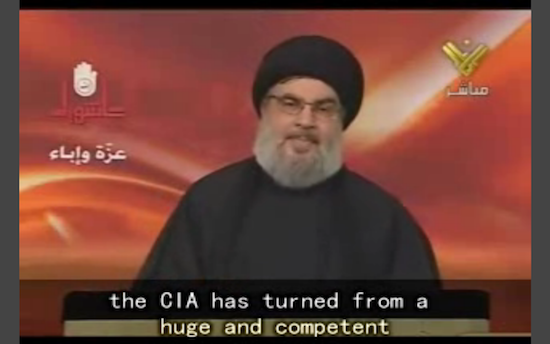Hezbollah vs. the CIA
Throughout its history, Hezbollah has proven adept at reinventing itself in times of crisis, defying its challengers to roar back to power after appearing on the verge of marginalization and defeat.
With that caveat, it’s hard to look the current state of play in Beirut as anything but dire for Hezbollah and promising for those who would like to see a weaker “Axis of Resistance.”
Syria’s dictator is on the way out, and Hezbollah looks reactionary and out of sync with history. Hassan Nasrallah has resorted to citing the resistance record of Syria and Iran, as if the only point in their favor is that they’ve stood against Israel and the United States.
Aryn Baker, writing in Time, points out that Nasrallah feted the other uprisings in the Arab world but when it comes to Syria, has “repeated Assad’s tired canard about foreign influences (read: the U.S. and Israel) driving the revolt.”
That double standard doesn’t sit well with a new generation of Arabs who say Hizballah is doing exactly the same thing Nasrallah mocked U.S. President Barack Obama for at the beginning of the Egyptian revolution: supporting a tyrant just because of his stance on Israel. “They call themselves the party of resistance, of justice, but where is the justice?” asks Issa Hammoud, a documentary filmmaker who had been a decade-long member of Hizballah, until he left the group a few months ago in disgust over its pro-Syria policy. “By supporting Assad’s regime they are proving they have no morals.” Perhaps. But Hizballah is also demonstrating that self-interest often trumps values.
Nasrallah also has focused a lot of attention on the efforts of the CIA in Lebanon, some of which apparently have been foiled by effective Hezbollah counter-intelligence. This embarrassment for the CIA, of course, has nothing to do with Hezbollah’s legitimacy. If everyone is doing the jobs they’re supposed to be doing, America and Israel will be trying to spy on Hezbollah and Syria and Iran, and vice versa.
At a moment when Lebanese and Syrians are wondering why Nasrallah won’t put any daylight between his popular movement and Syria’s repressive minority regime, Nasrallah has used the CIA scoop as a monumental distraction.
It can’t hide his woes, which have spilled over to the domestic political arena. The Hezbollah-backed prime minister recently moved ahead to fund the Special Tribunal pursuing Hezbollah suspects in the Rafik Hariri assassination.
Mona Yacoubian argues in Foreign Affairs that Hezbollah might turn its attention to domestic politics for a period, in order to consolidate its power at home.
Others have wondered whether instability in Lebanon and Syria could prompt Hezbollah to pursue the destabilizing but legitimizing cover of regional war, but Hezbollah watchers have argued that both Hezbollah and Israel seem to want to postpone a rematch of the 2006 war that both sides are convinced will be much more destructive than the last war.
Lebanon’s political weathervane, Druze chieftain Walid Jumblatt, has distanced himself from Hezbollah’s wildly pro-Assad position (he allied with Hezbollah a few years ago after spending a few years as Hezbollah’s loudest critic). “Those who are attached to the Syrian regime should recognize that they’re being hostile to the majority of the Syrian people,” Jumblatt told Al-Majalla magazine, as reported in The Daily Star.
Still, Hezbollah boasts the most formidable militia in the Arab world, and commands the undivided loyalty of its core supporters, even if the casual fans are drifting away. For the time being, the movement also can count of Iran’s critical funding. Even in the year of the Arab uprisings, Nasrallah scored as the most popular Arab leader on the Annual Arab Public Opinion Survey (although some non-Arabs did better; Nasrallah was tied with Iranian President Mahmoud Ahmedinejad and behind Turkey’s leader Recep Tayyip Erdogan).
So Hezbollah is unlikely in the short term to diminish as a player.
And Hezbollah’s unmasking of CIA agents in Lebanon serves as a stark reminder that the Party of God is a force with real tools in its arsenal, not just a rhetorically gifted leader who plays well on television. This week, Al Manar aired the name of a man it claims is the current CIA station chief in Beirut; the agency has replaced top officers in Pakistan twice in the last two years when their names were published.
However dim Hezbollah’s long-term prospects, it will remain a critical player in the short term. And if history is any indicator, it might just find a way to emerge – once again – stronger from a self-induced crisis that threatens to consign it to irrelevance.


